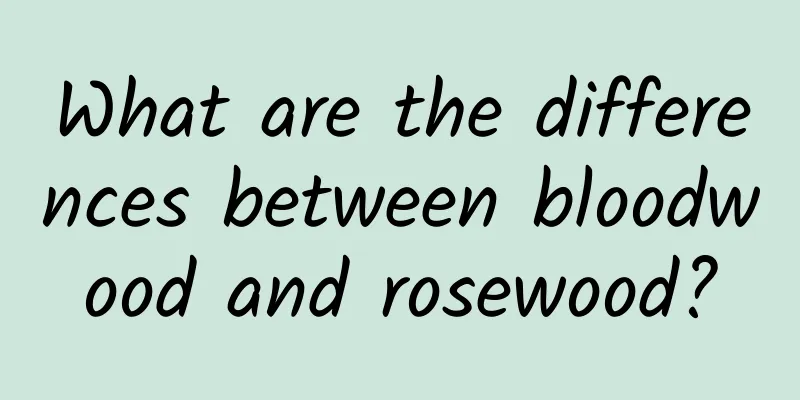What are the differences between bloodwood and rosewood?

|
Playing with toys is a way for modern people to enjoy life, and the items people play with are mostly wooden products, and the materials used to make wooden products are very valuable. For example, red sandalwood or bloodwood are both common precious wood species. Toys made of this material are durable and can also have a good conditioning effect on the body. Let's take a look at the differences between bloodwood and small-leaf red sandalwood? 1. Difference: Color: Bloodwood is yellowish in color, but its surface looks a bit like dyed blood red in the sun, showing an enchanting red color, without the warm feeling of red sandalwood at first glance; Surface texture: Bloodwood's texture is straighter, shallower, somewhat staggered, and the consumption wheel is not obvious; The holes punched in Bloodwood are irregular and have rough edges. But the ones made by red sandalwood are very uniform; the net-like pattern of blood sandalwood, the surface of blood sandalwood has scales like fish scales, and this kind of pattern is rarely seen on red sandalwood. 2. Characteristics of small-leaf red sandalwood: The wood grain of small-leaf red sandalwood is not obvious. The color is orange-red at first, and becomes deep purple like lacquer over time, and the growth rings are almost invisible. The vascular pattern is extremely fine and appears twisted like cow hair. Use an alcohol cotton ball to gently wipe the surface of the wood. If the cotton ball turns purple, it is red sandalwood. You can also scrape off some wood chips from the wood and soak them in alcohol. If the chips turn into blood-red strips, it is red sandalwood. No fragrance or very slight fragrance. The weight sinks in water, the board surface color is purple or dark purple, and has a fluorescent reaction. The ducts are filled with red gum and rosewood, and have a strong oily texture. 3. Characteristics of Bloodwood: The grain of blood sandalwood is relatively clear, and the cross-section is purple with large blood-colored spots, which are often scattered irregularly like hand smears. The overall density of bloodwood is small, but it also sinks in water. Place a sample of blood sandalwood under a glass window. After being exposed to light for only half a day (currently the summer sun), the color will become very dark, and the color change speed is fast. The oily feeling of bloodwood is not as strong as that of rosewood. Bloodwood, like red sandalwood, has fluorescence when soaked in water. The taste of blood sandalwood is a bit mixed, with a faint and fragrant green grass and wood fragrance, a faint milky fragrance, and a slightly sour taste. |
<<: What should I pay attention to after the buried suture double eyelid surgery?
>>: What are the taboos for the elderly to eat Panax notoginseng?
Recommend
The efficacy and function of Tiankui grass
As the pressure of modern life increases, more an...
Disappeared for more than 70 years! Reappeared again!
The reporter learned from the Guangxi Institute o...
Do you need to absorb the oil when eating instant noodles? Is oil-absorbing paper safe?
Recently, a magical operation of "absorbing ...
What are the effects of moxibustion on Polygala?
Polygala can be used to treat diseases by acupunc...
How long does it take for cholecystitis to heal after taking medicine?
Patients with cholecystitis are in great pain and...
The truth in the garden: Plants scream when they are hurt? Hydrangeas are sterile?
Do plants scream when they are injured? Are hydra...
It is used by southerners to make soup, but it is a miracle drug for curing hepatitis
Friends who have experienced the humid weather in...
Don't be afraid of radiation! It turns out that it has these functions...
Grain Full, the eighth of the 24 solar terms, sym...
What are the effects of carambola root and knife wound medicine?
The root of carambola is actually the root of car...
Online food delivery market – from Northern Europe to the world
The online food delivery market in the Nordic cou...
A chart to understand the 2024 industry technology issues: independent and controllable high-performance GPU chip development
On July 2, at the main forum of the 26th Annual C...
How are genes passed from parents to children?
When a child is born, people often gather togethe...
The efficacy and function of red blood vine
Many people are not very clear about red blood vi...
Can water that enters the ears really flow into the brain? Come and "wash your ears and treat your brain"
Author: Chen Jiameng: The Sixth People's Hosp...









